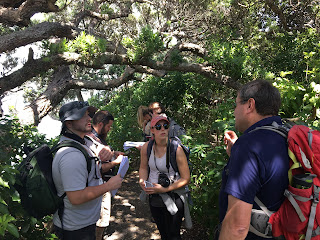Today, the group had plans to go to Tiritiri Matangi Island to learn about the islands conservation efforts to restore it back to its original state. Tiritiri is a pest free island which means that there are no animals such as mice weasels and snakes on the island. This is to insure the safety of the other animals and plants that inhabit the island. To keep the island pest free visitors must clear the bottoms of their shoes of dirt and make sure that no pests are currently residing in the bags that they are carrying onto the island. We also were given the rule that whatever you bring onto the island must leave the island with you for the safety and sanitation of the island.
Nick Terzulli (Nursing ‘19), Ryan Feeney (Nursing ‘19), Sara Wernick (Sociology ‘20), and Amanda Krom (Nursing ‘20) riding the ferry from Auckland to Tiritiri Matangi.
In order to get to the island we had to take the ferry from Auckland’s shore line to the island of Tiritiri which took us about an hour or so. Once we got there we were introduced to our tour guide Malcom who was a walking encyclopedia. Malcom explained to us that after the Persians killed off most of the bush with fire it left the island with only 6% of its natural state which still existence today. It took about ten years to finally turn that 6% into 60%. He also informed us that are a various amount of birds that habitat the island. This birds range from penguins to the very rare Kiwi. We were even lucky enough to see Tui, Saddleback, parakeet, Weka, and more.
Malcolm describing the nesting behavior of Grey-faced Petrels to Nick Terzulli (Nursing ‘20) and Emily Stanek (Nursing ‘20).
Malcolm explaining the restoration of native bush on Tiritiri Matangi.
One of the crazier things that we saw was a Tui laying on the ground with his wings spread out. Originally we thought that the bird was hurt but later learned that the Tui was sunbathing. We also hiked to the top of the island where the oldest lighthouse in the country is. Not only did we get to see some breathtaking views but we also got to see rare species of birds and we got to learn a lot more about the very unique island of Tiritiri Matangi.



No comments:
Post a Comment